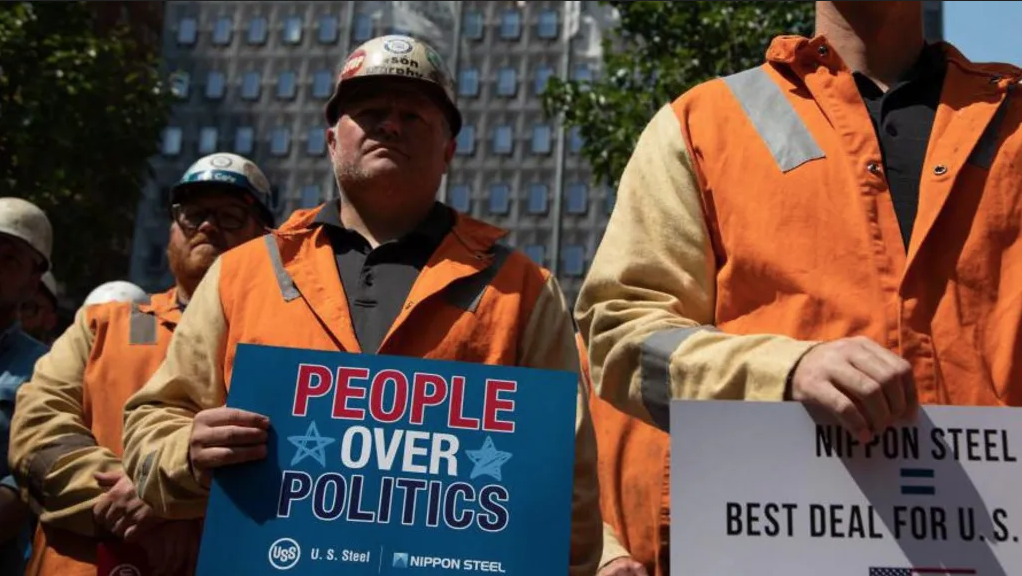President Joe Biden is preparing to block the takeover of a storied US steel-maker by a Japanese company, a controversial move that critics say would lead to job losses and could chill foreign investment in the US, according to US media reports.
The $15bn deal was announced by Japan’s Nippon Steel and US Steel last year.
It would have created one of the world’s biggest steel companies outside of China and had been hailed by investors as an answer to the company’s financial woes.
But it soon ran into resistance from politicians and the US Steelworkers union, which said it did not want to see the 123-year-old firm fall into foreign hands.
US Steel shares fell nearly 20% after reports of the decision, which involves a company headquartered Pennsylvania, a swing state, during a heated campaign season.
Mr Biden had already moved to have the deal probed on national security grounds and voiced opposition to the takeover earlier this year.
Both Donald Trump and Kamala Harris, rivals in the race for president, have also come out against the merger.
US Steel said it had not received any update about a formal decision and said it stood by the deal, noting that Japan was one of America’s “most staunch allies”.
“We fully expect to pursue all possible options under the law to ensure this transaction, which is [the] best future for Pennsylvania, American steelmaking, and all of our stakeholders, closes,” a spokesman said.
Earlier on Wednesday, the company held a rally to show support for the merger.
It warned that blocking the deal would put “thousands of jobs” at risk, prompting it to shut factories and potentially move its headquarters from Pennsylvania.
“We want elected leaders and other key decision makers to recognise the benefits of the deal as well as the unavoidable consequences if the deal fails,” chief executive David Burrit said in a statement announcing a rally in favour of the plans.
The deal has been under review by the Committee on Foreign Investment in the US (CFIUS), a group led by the Treasury Department that looks at national security concerns.
Treasury declined to comment on the president’s decision, which was first reported by the Washington Post and Financial Times. White House Press Secretary Karine Jean-Pierre said Wednesday the Committee on Foreign Investment in the US had not yet given a recommendation to the president.
Speaking to the BBC, a White House official did not deny reports of that the president planned to block the deal, saying only that receiving the CFIUS recommendation would be the “next step in this process”.
As of 2020, the US had formally blocked just five foreign investments via CFIUS, deals that involved Chinese firms.
Nippon Steel is based in Japan, a US ally.
Earlier this year, the US Chamber of Commerce warned against politicising such reviews, saying officials risked sending a “chilling signal” to firms abroad.
Though the involvement of CFIUS makes this case unusual, political intervention in the steel industry is not, said Alan Wolff, a visiting fellow at the Peterson Institute for International Economics and a former trade lawyer who has worked with firms, including US Steel.
More than 20 years ago, George W Bush, “otherwise a free-trader”, put in place protections for steel, he noted.
Donald Trump’s administration was also marked by a trade fight over tariffs put in place to protect US steelmakers. Biden modified those protections, easing tensions with allies, but still kept in place some guards.
The economic stature of US steel, founded by Andrew Carnegie, may have shrunk, but it still plays a big role in our national psyche, Mr Wolff said.
“It has a big part in our view of where manufacturing has gone and the threat to manufacturing jobs,” he said.
“That’s a big part of the Biden administration and it’s a big part of this election,” he said.
Stay informed with The Namibian – your source for credible journalism. Get in-depth reporting and opinions for
only N$85 a month. Invest in journalism, invest in democracy –
Subscribe Now!






